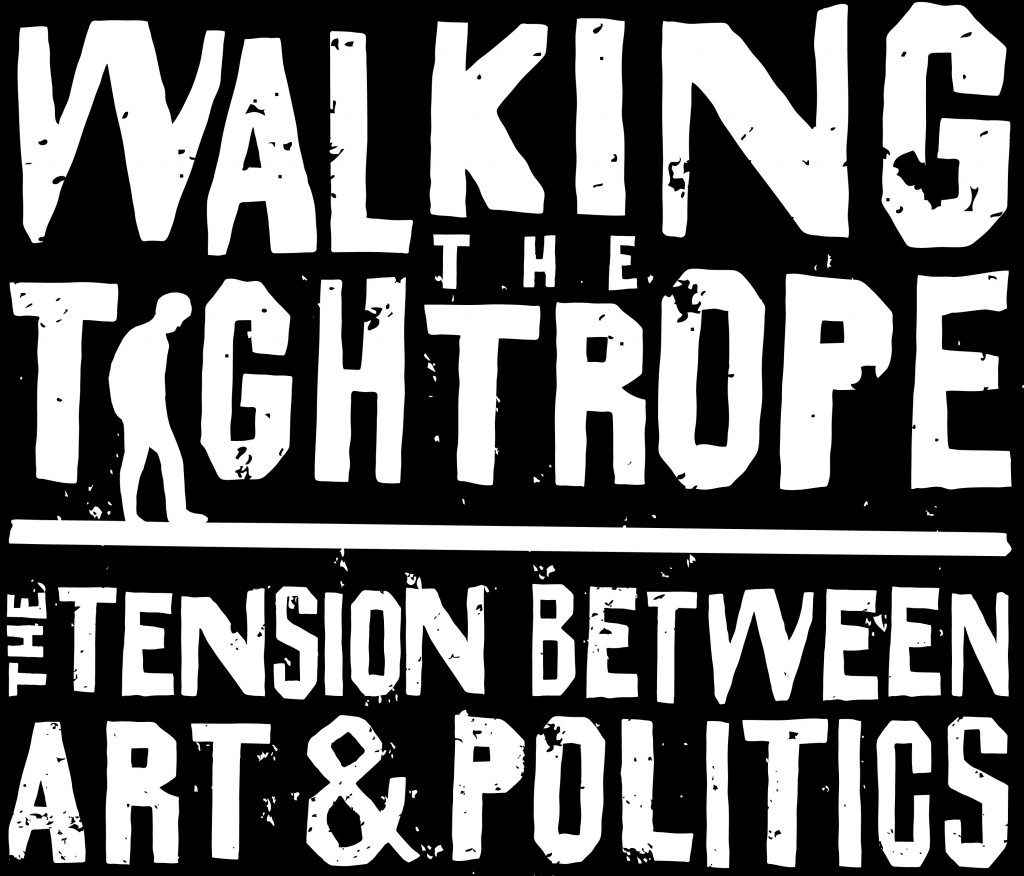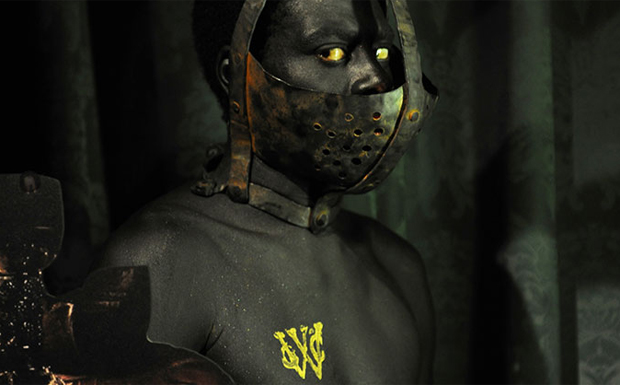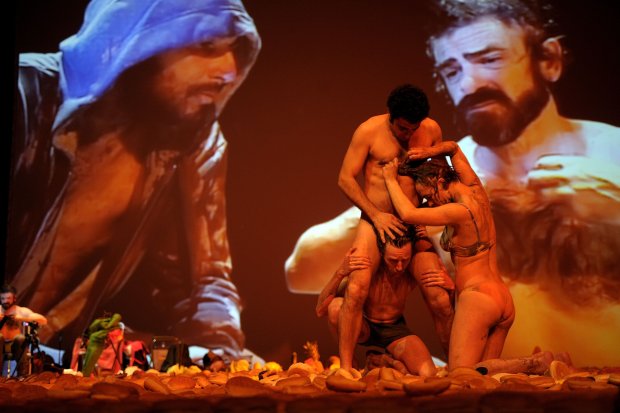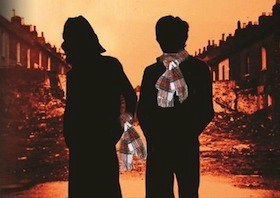19 Jan 2015 | Events

Presenting the world premiere of a collection of 12 explosive political five minute plays by writers including Mark Ravenhill, Neil LaBute and Caryl Churchill.
Arising from events and decisions relating to The Underbelly and Incubator Theatre’s The City, Exhibit B and the Barbican, and The Tricycle Theatre.
Each performance will include all twelve five minute plays and a lively post-show discussion exploring freedom of expression in UK arts today. Engage in discussion with the commissioned writers and a range of free expression advocates .
The post-show debate on on Friday 30th January will feature Index on Censorship CEO Jodie Ginsberg.
WHERE: Theatre Delicatessen, London, EC1R 3ER
WHEN: Monday 26th – Saturday 31st January, 7:30pm & Sat Matinee
TICKETS: £15 / £12 – available here
This event is produced by Offstage Theatre, in association with Theatre Uncut, and supported by Index on Censorship and Free Word.
6 Nov 2014 | Events, News

Exhibit B (Photo: © Sofie Knijff / Barbican)
Exhibit B, The City, the Tricycle Theatre… Several high profile cases this past summer have ignited a debate about artistic censorship in the UK.
Join us as part of RADAR Festival at the Bush Theatre in London to explore the rights of the artist to free expression, to examine the role of arts institutions in defending and promoting free expression, and to ask the question: is it ever better to censor than to cause offence? The event features:
WHERE: Bush Theatre, London, W12 8LJ
WHEN: Thursday 13 November 2014, debate 9.00-10.00pm (following show 7.30-8.30pm)
TICKETS: £10 (early bird, including show) at www.bushtheatre.co.uk or 0208 743 5050 (box office)
Follow the discussion via the hashtag #RADAR2014
Co-produced by Index on Censorship and the Bush Theatre as part of the RADAR Festival.
30 Jul 2014 | News, Poland, Religion and Culture

Golgota Picnic was pulled from a the Malta Festival in Poland after religious groups leveled threats.
The Polish theatre scene has been rocked by controversy since late June after the cancellation of Golgota Picnic, a show by the Argentinian theatre maker Rodrigo Garcìa that had previously aroused protest in France.
The play’s supposedly blasphemous content meant that Michał Merczyński, director of the Malta Festival, had pulled the headline show of his festival a week before its scheduled performance. The Malta Festival in Poznań is Poland’s answer to the Edinburgh Festival, and I was visiting with other directors from the Young Vic to learn more about Polish theatre culture. Our experience of the festival was derailed by claims and counter claims of blasphemy and censorship.
Merczyński’s decision to pull the show was based on information that a protest of 50,000 was planned and advice from the police that they could not guarantee the safety of the audience or the performers. The festival’s decision enraged large parts of secular Poland’s cultural elite, who feared that the police warning represented the state’s acquiescence to unofficial censorship by a group of interests centred upon the increasingly powerful Catholic church.
In reaction to the cancellation, there was a proliferation of protest screenings and staged readings of Golgota Picnic in theatres across Poland, some of which were variously picketed by a loose coalition of Catholics, neo-nazis and football hooligans. At the protest screening my group attended, at TR Warzsawa in Warsaw, these three groups all appeared to be embarrassed by each other. They prayed together and held placards warning that “Poland, motherland of Saint John-Paul II must not be a latrine for the trashes of the blasphemer, of the scoffers, of the traitors, of the barbarian and pseudo-artists”.
The Young Vic directors were jostled as we attempted to get in to the theatre and through the double cordon — first the protesters trying to stop us getting into the theatre, and then the police holding back the protesters. In the end we climbed over a low fence around a corner to get in and the police quickly bundled us into the building.
It’s important to say that this was much more exciting than it was scary. Here was evidence that theatre matters: people threatening hostility, if not quite violence, in response to an artwork. As far as I could make out from the DVD, Golgota Picnic (screened in Spanish with Polish subtitles) was a considered and beautiful meditation on the body and on Christ’s body in particular. Although it included a scene where a woman playing Jesus sculpted her gelled hair over another person’s genitalia, I’ve certainly seen more blasphemous plays. The crowd outside were fairly audible in their hymns and their chants, but — in the end, the protesters were defeated by the length of a piece of theatre. When we emerged two and a half hours later, they had given up and gone home.
The cancellation of Golgota Picnic left the Malta Festival deflated, but it felt as if these protests might be a powerful shot in the arm for Polish theatre culture in general. Several people we met were excited by the possibilities of the networks created and issues raised in the fight against religious censorship. Polish theatre provided a central political role in the end years of communism, and then lost its way only to be reinvented at the end of the nineties as a means to interrogate more universal themes in the formally explosive theatre of Gzegorz Jarzyna, Krzystof Warlikowski and Jan Klata, directors who still dominate the scene. It appears that Polish theatre is ripe for a new generation to redefine what theatre means.
As an outsider, this culture war looked complex and unhappy. Of course I was inside the theatre rather than on the street with a rosary, but it was clear that all the theatre people we met were well educated and well heeled. The Catholic protesters were not, and they felt like a demographic who had been left behind by the neo-liberalism that has replaced communism. It’s hardly surprising that these people are angry to see that “they are mocking us”, as one man complained to us on the steps of TR Warszawa.
It’s worrying to encounter theatre censorship in the EU, and artists should be free to present their work. At the same time, theatre institutions have a responsibility to ensure each piece of work finds its audience in the most productive way possible. With Golgota Picnic, the Malta Festival imported a show that had already caused protests elsewhere. Their marketing presented it as sexily controversial, and when this spectacularly backfired they cancelled the performance. Artists should shock and offend, but theatre makers and producers have to tread thoughtfully to ensure that the presentation of powerful work doesn’t play into the hands of those who would censor it.
Jeff James’s visit to Poland was supported by the Adam Mickiewicz Institute, the Young Vic and the Jerwood Charitable Foundation.
This article was posted on July 30, 2014 at indexoncensorship.org
30 May 2014 | News, Religion and Culture, United Kingdom
 For the last two decades the stubborn, powerful myth that the creative arts and the Protestant working class in Northern Ireland do not go together has been regularly proclaimed.
For the last two decades the stubborn, powerful myth that the creative arts and the Protestant working class in Northern Ireland do not go together has been regularly proclaimed.
Closer reading reveals a plethora of Protestant dramatists including, but not limited to: Sam Thompson, Stewart Parker, Ron Hutchinson, Christina Reid, Graham Reid, Marie Jones, and Gary Mitchell. This is of course a typically unfortunate sectarian head-count, but a necessary one in light of matter-of-fact declarations from Irish Republicans that Ulster Protestants have ‘no culture’, and – perhaps more damagingly – the identical conviction of a large number of working class Protestants themselves.
With this is mind it is worth distinguishing between ‘loyalist’ and ‘Protestant working class’ voices. The phrases have become interchangeable (despite the way the Protestant electorate has long given loyalists the cold shoulder), and many local and international commentators in the media and academia continue to refuse the distinction. On the other hand, with the exception of the lively 1982 community play This is It!, loyalists are indeed without any real lineage in the theatre.
It is therefore vital that Ulster loyalists take their place on the stage, a process which began on 1 May when Bobby Niblock’s play Tartan opened in East Belfast’s Skainos Centre before going on to close the city’s Cathedral Quarter Arts Festival. A production of the recently-formed Et Cetera theatre company, this was an avowedly loyalist exercise in the sense that Niblock is an ex-prisoner depicting one of its stories. Initially the Tartans fought other gangs from within the same community but many went on to join loyalist paramilitary groups, a difference and tension the play explores.
At an Index on Censorship symposium held in the University of Ulster’s Belfast campus on 3 May, I was charged with leading one of four breakout sessions exploring why loyalist voices are under-represented in the theatre. The challenge facing the Et Cetera group was brought home when only one person from this comfortable set showed up, perfectly encapsulating part the problem. The one major complaint of loyalists in post-Troubles Northern Ireland is that their voice is simply ignored. I was initially apprehensive about spearheading a discussion even mentioning ‘loyalism’, as it is now a pejorative term of abuse. The way the conference attendees reacted typically reflects the complete unwillingness to engage with this disillusioned section.
Many loyalists have hitherto been convinced that the best way they can make their voices heard is to block roads and intimidate. They feel the ‘peace process dividend’ has nothing to offer them, while report after report pitches the Protestant working class male right at the bottom of the educational attainment table (only just in front of Irish traveller and Gypsy/Roma, according to the latest Peace Monitoring Report). These are the men who find themselves languishing in the back of police vans and holding cells at the end of an evening of rioting, as well as being the first target for the paramilitaries.
No-one would be so naïve as to believe that a play alone could stop violence, but seeing a play – like all art – can soften human beings as well as advance understanding. The late Seamus Heaney once said of his own medium that ‘It can eventually make new feelings, or feelings about feelings, happen’, and the creative process often leads to self-examination. In Tartan two young men reflect while they assemble a crate of petrol bombs: it’s their future they’re on the verge of hurling away along with the incendiaries. A diversity of viewpoints are similarly on show. Some of the boys are already hard-liners; others remind us that most Catholics don’t support the IRA. While empathetic to its young, exploited protagonists, it is also upfront about their mistakes and prejudices.
Tartan has flaws – including a noticeably stronger second half – but it is one hell of an opening salvo. The energy of these young males reverberates off the stage, giving speech and form to a violence which continues to scar the North’s streets, as well as highlighting the essence of the Et Cetera group itself: as an outlet for new stories and energies previously untapped.
The dangers of a loyalist underclass are unlikely to be apparent to an English or international audience. They remain rather less deadly than dissident republicans, but Tartan’s relevance – anchored in the perspective of misled young Protestant men – becomes especially resonant in the wake of the increased recruiting and activities of the most serious loyalist paramilitaries.
The Man Who Swallowed a Dictionary, a play about David Ervine – another ex-prisoner who died prematurely of a heart attack in January 2007 – is Niblock’s follow-up project. Earning this (provisional) title in real life for being articulate in a culture which does not value articulacy, Ervine served his sentence in the same prison as Niblock and had represented one of the few political voices for disempowered loyalists. The loss was enormous, but the return of this voice is next.
This article was originally posted on May 30, 2014 at indexoncensorship.org




 For the last two decades the stubborn, powerful myth that the creative arts and the Protestant working class in Northern Ireland do not go together has been regularly proclaimed.
For the last two decades the stubborn, powerful myth that the creative arts and the Protestant working class in Northern Ireland do not go together has been regularly proclaimed.